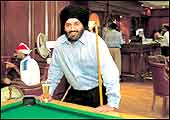 |
JOHN AZARIA, 33, CTO,
BRIGHT SWORD TECHNOLOGIES
Azaria, who once worked for Microsoft in
the US, says having made a pile, he has the luxury of letting
himself be motivated by things other than money. He saves a
lot and subscribes to some charities |
 |
GOVVIND AMBADY, 38,
VP (COMMODITY SOURCING & EXPORTS), AGRO TECH
Ambady makes Rs 40 lakh a year, saves
20 per cent of that, and invests another 10-15 per cent.
He owns properties in Hyderabad and Chennai and holidays abroad
with his family regularly |
I
hear it every morning at the station where I catch my train to Mumbai's
business hub, Nariman Point. Over the assorted noises created by
the heaving humanity of which I am a part; above the Fritz Lang
inspired ditties that keep echoing through my head (I owe, I owe,
so off to work I go, and Ashes to ashes, dust to gold, or a six-day
week from dawn to dusk); overwhelming even the occasional announcement.
This is the sound of money, the healthy clink of loose change, the
rustle of crisp Rs 500 notes-and what else would it be in the country's
commercial capital?
So, when my editor asks me to write about the
young salaried rich I am, at once, envious and excited. There is
a vicarious pleasure in learning how much other people earn, and
how they spend it. And there is the sense of anticipation. Some
day, not too far away, perhaps, I hope to belong to this emerging
class. Foreign media, where art thou?
The size of this group varies, depending on
just which estimate you are looking at. The 2003 World Wealth Report,
brought out by Cap Gemini Ernst & Young and Merrill Lynch claims
there are at least 50,000 individuals in India with financial assets
(excluding real estate) over $1 million (Rs 4.7 crore). Says Pradeep
Dokania, Executive VP, DSP Merrill Lynch, ''The proportion of salarymen
among these high net worth individuals is on the rise.'' The National
Council of Applied Economic Research's India Market Demographics
2002 states that there were 80,000 urban households in the country
with household incomes higher than Rs 20 lakh in 1998-99, up from
26,000 in 1995-96 and 11,020 in 1993-94. A simple exercise in extrapolation
would put the number at 3,54,000 for 2003. And search firm Stanton
Chase International, which estimates 100,000 individuals earn salaries
over Rs 20 lakh today (a conservative estimate, going by the NCAER
stats), expects the number to double by 2006, and then, again, by
2009.
|
WHO ARE THEY?
|
|
Young salaried millionaires. They
are people under 40 who have become rich on salaries.
|
| WHERE CAN YOU FIND THEM? |
| All over the country.
Although the very nature of the businesses mean you
will find more in banking and IT. |
| HOW RICH ARE THEY? |
| Reasonably so.
There are at least 100,000 individuals who earn more than Rs
20 lakh a year. |
| WHY ARE THEY RELEVANT? |
| As customers & role
models. When you are rich you can start giving back
to society. Or just spend it all. |
Whichever number you go by, it is evident that
the number of the salaried rich is on the increase. "Over the
past five-to-six years, salaries have grown substantially and this
has given rise to a new social class," says Arvind Singhal,
Chairman, ksa Technopak, a Delhi-based consulting firm. That's evident
in the annual reports of companies. In 2001-02, Wipro's annual report
listed 171 individuals earning over Rs 24 lakh a year; by the next
year's report this number had grown to 300; and today, claims a
Mumbai-based headhunter, the company has 500 employees earning over
Rs 20 lakh per annum.
There's Rajiv Aggarwal in Mumbai, all of 34
and a Vice President at insurance brokerage Marsh India. He saves
50 per cent of his take-home salary, but still manages to holiday
abroad and eat at the finest restaurants... regularly. "My
lifestyle has changed to the extent that I have upgraded from a
Titan to a Omega," he says, pointing to his wrist. Around 1,200
kilometres away, in Bangalore, another man points to his wrist too
(what is it with Omegas?). Apart from the watch, and other visible
signs of wealth-a Honda sedan and a Mont Blanc pen-there is the
small thing about 39-year old Krishnan Nair, the executive vice
president of sales and marketing at tech hotshop Kshema Technologies
managing to save 40 per cent of what he earns. In the city that
loves wealth more than anything else, New Delhi, 32-year-old Vijay
Iyer, a senior manager in audit firm Ernst & Young's (E&Y's)
international tax practice spends 40 per cent of his salary, invests
30 per cent, and saves the reminder. He's just acquired a plush
condominium in satellite-city Gurgaon and along with wife Sonu,
also an E&Y employee, holidays abroad more often than not. And,
just to complete the picture, in wannabe-metro Hyderabad, Govvind
Ambady the 38-year-old vice president in charge of commodity sourcing
and exports at Agro Tech Foods makes Rs 40 lakh a year, saves 20
per cent of that, invests another 10-15 per cent, and lives it up
with the rest. He owns an apartment in Hyderabad and beachfront
property in Chennai, holidays abroad with his family regularly,
and works out for 90-minutes-a-day in his personal gym. Sigh!
 |
KRISHNAN NAIR/39/EXECUTIVE
VP (SALES & MKTG)/KSHEMA
Nair saves 40 per cent of what he
earns. He doesn't mind the visible signs of his wealth,
an Omega watch, a Honda sedan and a Mont Blanc pen |
 |
SARAVJIT SINGH DHILLON/36/CFO/AIRTEL
Dhillon wishes to retire rich and young before he turns 40
so that he can spend more time with his family |
Living It Up
You live only once. That seems to be the refrain
of most among the young salaried rich. "They have 25-30 years
of work ahead of them," says KSA's Singhal proffering an explanation
as to why this class invests and saves for a better future while
not sacrificing on spending for a comfortable present. "Even
when the going is not too good, I cannot compromise on things like
going to a restaurant at a five-star for a meal or holidaying abroad,"
says Vikas Agnihotri, a regional ops head at Standard Chartered.
"Savings aren't everything; you need to lead a reasonably good
life." And so, Agnihotri and his wife, Shweta, the head of
the home video business of music major Saregama live it up (and
are currently digging around Versova and Vile Parle, both uptown
Mumbai boroughs for real estate they can buy and rent out, thereby
earning some more money-remember the money begets money saw, it's
true). That's a sentiment echoed by Delhi-based Sandeep Vyas, who
earns his keep (and more) from a business, coffee bars, that is
itself as much a product of the times as the class to which he belongs.
"Five years ago, I had a Maruti Zen, then an Esteem, a Ford
Ikon, and now a Honda City," says the vice president in charge
of global business at Barista, putting a rather literal slant on
the term upward mobility.
Part of the change can be attributed to India's
economic transition from a die-hard socialist nation into a free
market of sorts. My parents and their parents before them-salarymen,
all-believed in thrift. Spending was frowned upon, especially if
it wasn't for what were termed "necessities". Five-entreed
lunches at restaurants certainly wouldn't fit their definition (or,
for that matter, anyone else's) of that. Today, "spending has
achieved cultural and social connotations," says Purvi Sheth,
a consultant at Shilputsi, an executive search firm. Salarymen are
keenly aware of how much they are worth and do not see why they
shouldn't live life the way the people whom they work for do. Come
to think of it, there's no reason they shouldn't.
|
|
VIKAS AGNIHOTRI/38/REGIONAL
OPS HEAD/STANCHART
Agnihotri and his wife, Shweta, are currently digging around
upmarket Versova and Vile Parle for
real estate they can buy and rent out |
Paying A Premium
Marketers may rejoice at all that spending,
but recruiters aren't exactly happy. Today, execs expect their employers
to underwrite their aspirations. A senior manager who was being
pursued by a multinational footwear company insisted that the latter
lay on a perquisite to cover his child's school tuition, close to
Rs 10 lakh a year. This, in addition to a compensation of close
to Rs 75 lakh a year. Another exec demanded a house in Mumbai's
tony Colaba neighbourhood-in the same block where his father lived-from
a consumer goods company that was keen to sign him on. Both got
all they wanted: the jobs, the school tuition, the house.
Companies are willing to pay big money for
individuals who can come on board and make a difference. The software
and investment banking businesses love rainmakers, consumer goods
companies will give almost anything for ace marketers, manufacturing
firms place a premium on production hotshots, and everyone adores
an executive with a successful track record across companies. With
several sectors of the industry-think insurance, telecommunications,
business process outsourcing, media-in start-up mode, adds R. Suresh,
the CEO of search firm Stanton Chase, salaries have increased manifold.
"When you are starting up operations, you need well-paid executives
who will meet business goals." And if you have to pay a premium
for them, so be it.
|
|
VIKAS MISRA/35/VP/POLARIS
Misra prefers to invest in equities of
blue chip companies that have a long-term perspective |
Making That Difference
You'd expect execs who work hard and play harder
to be happy. I did, and I was surprised to have more than one speak
of the future with a certain amount of trepidation. "My salary
is less than a fourth of what I take home," says one investment
banker who earns over Rs 1 crore a year. "The rest is a performance
bonus, and we do not know how long these bonuses will continue."
Investing wisely is the way out but even our
investment banker friend shuns the stockmarket. Between 80 per cent
and 90 per cent of his investments are in RBI bonds. "I dabbled
in the market and burnt my fingers," confesses Gul Raj Bhatia,
Vice President, Marketing of NIIT's education and training business.
Today, the bulk of Bhatia's investments are in debt instruments.
And even those who venture into equities, stick to the blue-chips,
like Vikas Misra, a 35-year-old vice president at software company
Polaris, does. "I invest in equities with a long-term perspective."
|
|
VIJAY IYER/32/SENIOR
MANAGER/E&Y
Iyer spends 40 per cent, and invests
30 per cent of his salary. He has just acquired a plush
condominium in Gurgaon and mostly holidays abroad |
Whether they abhor equities or not, if the young
salaried rich invest wisely, they can retire young, and many of
them are aware of this. "I will retire on September 23, 2006,
a day before I turn 40," says Saravjit Singh Dhillon, now 36,
and the CFO of Airtel, India's largest cellular telephony company.
And then, they plan to turn their minds to other things. Some, like
Dhillon just want to spend more time with their families. Others,
like 37-year-old Vikas Gupta, the CEO of Lacoste India, want to
do something very very different from what they have done thus far.
Gupta, in case you are interested, wants to start a café
(on the beach) and a crèche. "My wife can run the crèche,
and I can manage the café," he laughs. And still others
are focused on the P-word, philanthropy. Barista's Vyas wants to
"empower children in rural areas (through education)",
as does Polaris' Misra. And Kshema's Nair wants to run an old-age
home. "Affluence has brought me closer to living with values,"
sums up Standard Chartered's Agnihotri. "I realise there are
many people who haven't got the kind of opportunities my wife and
I did-in our own way, we try and make a difference to society."
Not having to work for a living... make that never having to work
for a living... may have a happy ending for us all.
additional reporting by Moinak
Mitra, E. Kumar Sharma, Nitya Varadarajan, & Venkatesha Babu
|

